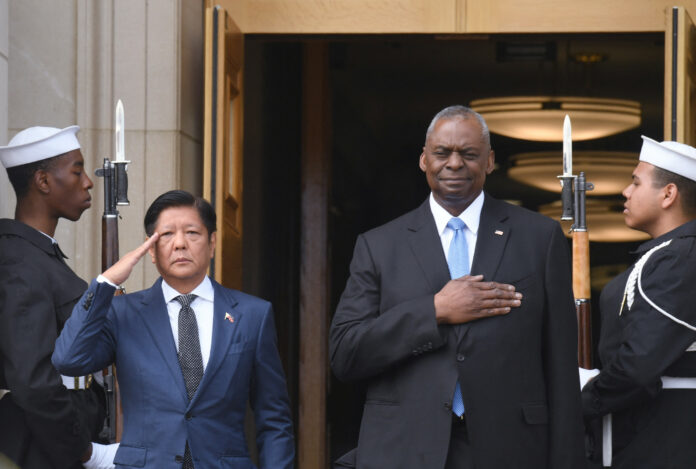Philippine President Ferdinand Marcos Jr. has clarified what it would take to trigger his country’s defense pact with the United States—a question that has risen to the fore in recent weeks after confrontations with China in contested waters.
“I think Secretary [of Defense Lloyd] Austin explained it very well, if any Filipino serviceman is killed by an attack from any foreign power, then that is time to invoke the Mutual Defense Treaty,” the head of state told reporters in Manila on Monday.
Marcos had just returned from the U.S., where he joined President Joe Biden and Japanese Prime Minister Fumio Kishida Thursday in the countries’ first three-way summit, and discussions of the U.S. allies’ territorial disputes with China featured prominently.
On Friday, Marcos met Austin who, like Biden, reaffirmed that the Mutual Defense Treaty “extends to both countries’ armed forces, public vessels, and aircraft—including those of its Coast Guard—anywhere in the Pacific, including the South China Sea,” according to a Pentagon statement.
Olivier Douliery/AFP via Getty Images
Marcos’ talks with Austin seem to have added context to a provision some experts have criticized as being overly vague.
Article 5 of the 1951 treaty states that an armed attack—which would compel one partner to come to the defense of the other—includes an “armed attack on a metropolitan territory of either of the parties or on the Island territories under its jurisdiction in the Pacific Ocean, its armed forces, public vessels or aircraft in the Pacific.”
Manila-based geopolitical analyst Don McLain Gill told Radio Free Asia last month that Beijing has been taking advantage of this ambiguity.
“There needs to be a firmer operational definition of an ‘armed attack’ because without doing so, China will continue to exploit such terminological ambiguities,” Gill told Benar News.
China’s foreign ministry didn’t immediately respond to Newsweek‘s written request for comment.
“It’s still an ambiguous term. Should firearms be used to trigger the MDT (Mutual Defense Treaty)? If so, it does not address the casualties on our side,” he added.
Chinese forces based in the South China Sea, nearly all of which it claims as its territorial waters, have used increasingly aggressive tactics in their efforts to deter Manila’s maritime activities within its own exclusive economic zone.
An exclusive economic zone is a 200-nautical-mile (230 mile) area within which maritime law grants a coastal state the sole right to exploit natural resources.
During two separate Philippine supply missions to a remote military outpost at the disputed Spratly Islands’ Second Thomas Shoal last month, China Coast Guard water cannons damaged a supply boat and injured Philippine service members. Several were hospitalized.
Beijing said its Coast Guard was safeguarding national sovereignty in a professional manner.
Uncommon Knowledge
Newsweek is committed to challenging conventional wisdom and finding connections in the search for common ground.
Newsweek is committed to challenging conventional wisdom and finding connections in the search for common ground.


